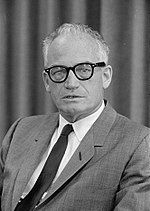Barry Goldwater, Date of Birth, Place of Birth, Date of Death
TweetBarry Goldwater
American politician
 Date of Birth: 02-Jan-1909
Date of Birth: 02-Jan-1909
 Place of Birth: Phoenix, Arizona, United States
Place of Birth: Phoenix, Arizona, United States
Date of Death: 29-May-1998
Profession: photographer, businessperson, politician, military officer, aircraft pilot
Nationality: United States
Zodiac Sign: Capricorn 
About Barry Goldwater
- Barry Morris Goldwater (January 2, 1909 – May 29, 1998) was an American politician, businessman, and author who was a five-term Senator from Arizona (1953–1965, 1969–1987) and the Republican Party nominee for president of the United States in 1964.
- Despite his loss of the 1964 presidential election in a landslide, Goldwater is the politician most often credited with having sparked the resurgence of the American conservative political movement in the 1960s.
- He also had a substantial impact on the libertarian movement.Goldwater rejected the legacy of the New Deal and fought with the conservative coalition against the New Deal coalition.
- Although he had supported earlier civil rights legislation, he notably opposed the Civil Rights Act of 1964 as he believed it to be an overreach by the federal government.
- In 1964, Goldwater mobilized a large conservative constituency to win the hard-fought Republican presidential primaries.
- Although raised as an Episcopalian, Goldwater was the first candidate of ethnically Jewish heritage to be nominated for President by a major American party (his father was Jewish).
- Goldwater's platform ultimately failed to gain the support of the electorate and he lost the 1964 presidential election to incumbent Democrat Lyndon B.
- Johnson.
- Goldwater returned to the Senate in 1969 and specialized in defense and foreign policy.
- As an elder statesman of the party, Goldwater successfully urged President Richard Nixon to resign in 1974 when evidence of a cover-up in the Watergate scandal became overwhelming and impeachment was imminent. Goldwater's views grew more libertarian as he reached the end of his career; he retired from the Senate in 1987.
- A significant accomplishment of his career was the passage of the Goldwater–Nichols Act of 1986.
- He was succeeded by John McCain, who praised his predecessor as the man who "transformed the Republican Party from an Eastern elitist organization to the breeding ground for the election of Ronald Reagan." Goldwater strongly supported the 1980 presidential campaign of Reagan, who had become the standard-bearer of the conservative movement after his "A Time for Choosing" speech.
- Reagan reflected many of the principles of Goldwater's earlier run in his campaign.
- The Washington Post columnist George Will took note of this, writing: "We [...] who voted for him in 1964 believe he won, it just took 16 years to count the votes." After leaving the Senate, Goldwater's views cemented as libertarian.
- He criticized the "moneymaking ventures by fellows like Pat Robertson and others [in the Republican Party] who are trying to...make a religious organization out of it." He lobbied for homosexuals to be able to serve openly in the military, opposed the Clinton administration's plan for health care reform, and supported abortion rights and the legalization of medicinal marijuana.
- In 1997, Goldwater was revealed to be in the early stages of Alzheimer's disease.
- He died one year later at the age of 89.
Read more at Wikipedia
See Also
- Famous People's Birthdays on 02 January, United States
- Famous People's Birthdays in January, United States
- Famous photographer's Birthdays on 02 January, United States
- Famous photographer's Birthdays in January, United States
- Famous businessperson's Birthdays on 02 January, United States
- Famous businessperson's Birthdays in January, United States
- Famous politician's Birthdays on 02 January, United States
- Famous politician's Birthdays in January, United States
- Famous military officer's Birthdays on 02 January, United States
- Famous military officer's Birthdays in January, United States
- Famous aircraft pilot's Birthdays on 02 January, United States
- Famous aircraft pilot's Birthdays in January, United States

